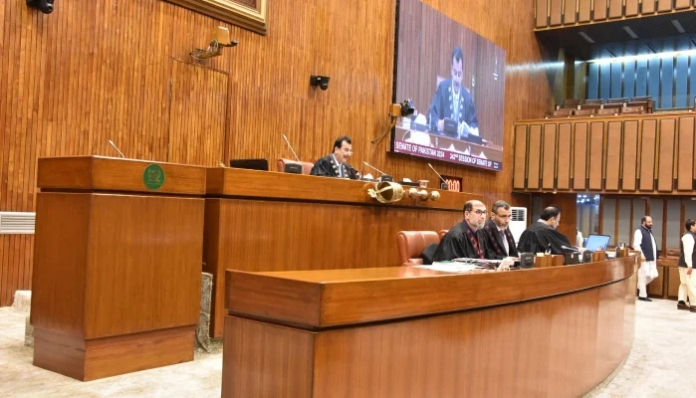ISLAMABAD, SEP 12 (DNA) : As soon as the government secures a two-third majority in both houses of parliament, it will make a constitutional amendment to extend the retirement age of the superior court’s judges.
The source revealed that the government and treasury benches need just three more votes in the Senate to make an amendment in the Constitution to extend the tenure of superior court judges.
But when contacted, Federal Minister for Information and Broadcasting Attaullah Tarar neither confirmed nor denied anything. Upon showing inquisitiveness,the minister said he would get back after getting in touch with the law minister. However, he didn’t return until filing of this report.
The source, however, on condition of anonymity, said the government has already managed a two-third majority in the National Assembly.
“We are short of only three votes in the Senate,” the source said, adding, “We are expecting to get the magic number any time and as soon as it is achieved, the constitutional amendment will be introduced and passed by parliament.”
The Article 179 of the Constitution envisages that a judge of the Supreme Court shall hold office until he attains the age of 65 years unless he sooner resigns or is removed from office under the Constitution. Article 195 of the Constitution says that a judge of a high court shall hold office until he attains the age of 62 years unless he sooner resigns or is removed from office following the Constitution.
The government intends to increase the retirement age of SC judges to 68. In the case of high court judges, the retirement age will be increased to 65. This would be possible only through a constitutional amendment.
A few months back, Law Minister Azam Nazir Tarar had told the media that across-the-board increase in retirement age, including that of judges, was being considered by the government.
On May 7, a newspaper reported Attaullah Tarar as dismissing the notion that a proposed extension in the retirement age was to favour “one particular institution”, adding that the move would be implemented across the board, if approved.
Whereas, the law minister was quoted as saying, “I will not vehemently turn down the proposals related to the tenure of chief justice.”
Later, the government has been repeatedly denying that there was any proposal under consideration for an extension in the tenure of the chief justice, who also said that he would not accept any extension.
A press release issued by the Supreme Court on September 10, to clarify speculation relating to the incumbent chief justice’s recent off-the-record conversation with reporters, said, “The chief justice was asked about the extension of his tenure, to which he replied that several months earlier the law minister had come to him in his chamber and stated that the government was considering fixing the tenure of chief justice of Pakistan for three years.
“The chief justice informed the journalists that he told the law minister that if the proposal was individual-specific and, if enacted, it would not be something he would accept,” says the press release adding that the senior puisne judge and attorney-general were present on this occasion.

















